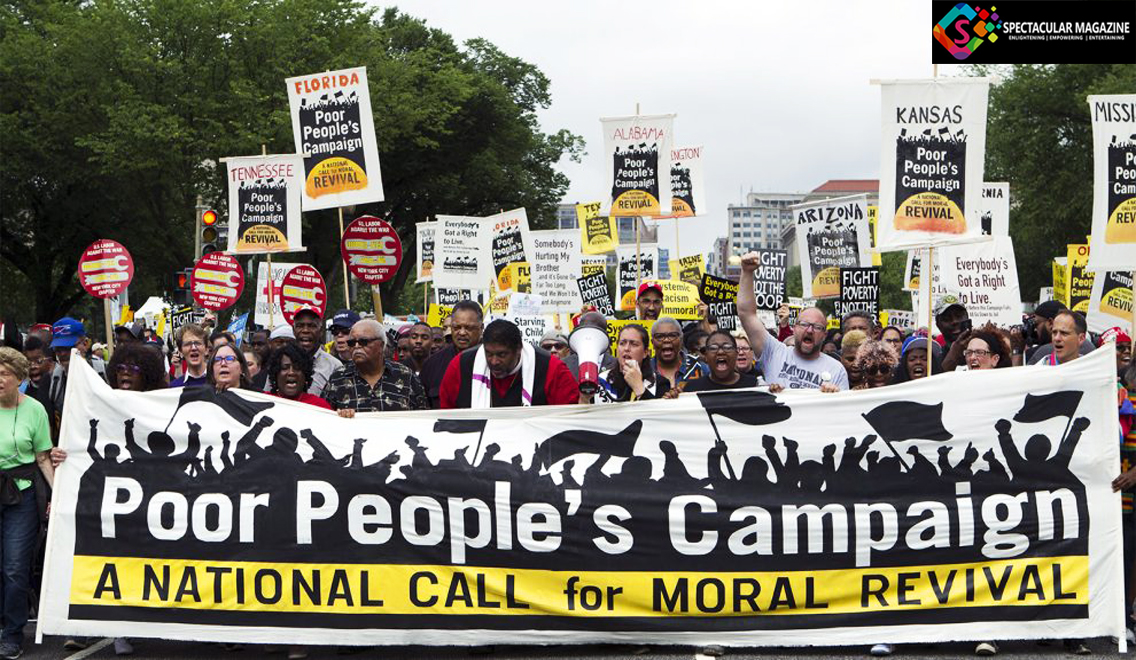NC Poor People’s Campaign to Launch Statewide Tour to Shine Light on Issues Facing Poor Carolinians
North Carolina is part of a 28-state ‘National Emergency Poverty and Truth Bus Tour’ Aimed At Combating Policy Violence Against the Poor
North Carolina – The North Carolina Poor People’s Campaign will launch the state’s leg of the National Emergency Poverty and Truth Bus Tour April 27th in Asheville, NC. North Carolina is one of 28 states participating in the national Poor People’s Campaign organizing tour, a push to highlight the urgent crises facing the nation’s 140 million poor and low-income people and hold accountable the officials and electeds who perpetuate policy violence against vulnerable communities.
The National Emergency Truth and Poverty Bus Tour comes amidst a barrage of attacks on the poor from Washington and states across the country, including attempts by the president to divert critical funds away from social safety net programs toward the military and the border wall. It marks the next phase of the campaign’s nationwide efforts to highlight the real emergencies of poverty, systemic racism, ecological devastation, militarism and our distorted moral narrative; build power in often overlooked and underserved communities; and impact policies and elections.
North Carolina Bus Tour to include Stops in Asheville, Charlotte, Greensboro, Sanford, Robeson County, Warsaw, Durham and Raleigh.
The North Carolina tour will visit Asheville, Charlotte, Greensboro, Sanford, Red Springs, Warsaw, Durham and Raleigh. Local stops are designed to shine a light on injustices facing poor North Carolinians. In North Carolina about 9,000 people are homeless. Working at the state minimum wage, it takes 87 hours of work per week to afford a 2-bedroom apartment. Two million workers make under 15 dollars an hour—49.7 percent of North Carolina’s workforce. Of the 35,697 people imprisoned, about 61 percent are people of color. Black residents are incarcerated at over four times the rate of White residents.
Over five days we will visit 8 locations to bring attention to the real national emergencies that are taking place across North Carolina every day. We will host town halls and marches with the local communities as well as private testimonies and driving tours of impacted neighborhoods. We will also be building momentum to May 1st, International Labor Day, where we will be in partnership with the North Carolina Association of Educators in Raleigh.
The national bus tour launched March 23 in Charleston, SC on the 50th anniversary of the historic Charleston hospital strike. Throughout the tour, organizers will sign up poor people, clergy, and activists for a June Poor People’s Moral Action Congress in Washington, DC.
Stops in the state include a town hall in Asheville to discuss the links between health and poverty, a driving tour of the ecological devastations of the Atlantic Coast Pipeline building and the aftermath of Hurricane Florence, and a rally in Durham to highlight the injustices of the jail and prison system and successes of organizers in that community.
Calendar of events below:
APRIL 30, 5 PM ET – Durham, NC: In Durham, we will gather outside the Durham County Courthouse, within walking distance of the Durham County Detention Center, to hear from Durham residents who have been impacted by unjust practices and policies in the Durham criminal justice system. We will also hear about the powerful local organizing to demand change in our community. Location: Durham County Courthouse Steps, 510 South Dillard Street, Durham, NC 27701.
MAY 1, 10 AM ET – Raleigh, NC: The NC Poor People’s Campaign is joining with the North Carolina Association of Educators (NCAE) to highlight the urgent need for Medicaid expansion, for a living wage for all workers, and for fully funded public education. We will gather at the NCAE office at 9AM–look for Poor People’s Campaign banners so we can march together. There will be a brief rally at 10AM, then a march to the General Assembly 16 W Jones Street starting at 10:30AM. A larger rally will take place on Halifax Mall at 12:30pm, and at 1:30pm we will begin meeting with legislators to make our demands known. Location: North Carolina Association of Educators Office, 700 S. Salisbury Street, Raleigh, NC 27601
For details on all tour stops, CLICK HERE.
Background
The Poor People’s Campaign: A National Call for Moral Revival is co-organized by Repairers of the Breach, a social justice organization founded by the Rev. Barber; the Kairos Center for Religions, Rights and Social Justice at Union Theological Seminary; and hundreds of local and national grassroots groups across the country.
In 2018, the campaign waged 40 days of direct action, marking the most expansive wave of nonviolent civil disobedience in U.S. history, calling attention to the issues facing the nation’s poor and disenfranchised communities. More than 30,000 people participated in over 200 direct actions at statehouses from coast-to-coast and in Washington, DC. Over 3,000 people participated in nonviolent civil disobedience.
In North Carolina during the 40 days of direct action, organizers trained over 600 people in Non-Violent Direct Action Tactics and over 100 people risked arrest over the 6 weeks. One of those most successful actions was when activists staged a sit-in at Phil Berger’s office to bring attention to Education, Living Wages, Jobs, Income, Housing, the focus of our actions that week.
Throughout the 40 days of action in NC, we were featured several times on statewide and local news including a mention on WUNC nearly every week of our actions.
For the past two years, leaders of the Poor People’s Campaign: A National Call for Moral Revival have carried out a listening tour in dozens of states across this nation, meeting with tens of thousands of people from El Paso, Texas to Marks, Mississippi to South Charleston, West Virginia. Led by the Revs. Barber and Theoharis, the campaign has gathered testimonies from hundreds of poor people and listened to their demands for a better society.
A Poor People’s Campaign Moral Agenda, announced last year, was drawn from this listening tour, while an audit of America conducted with allied organizations, including the Institute for Policy Studies and the Urban Institute, showed that, in many ways, we are worse off than we were in 1968: 23 states have passed racist voter suppression laws; 140 million people live in poverty; each year more than 250,000 people die in the United States from poverty and related issues; and the share of national income going towards the top 1 percent of earners has nearly doubled.


